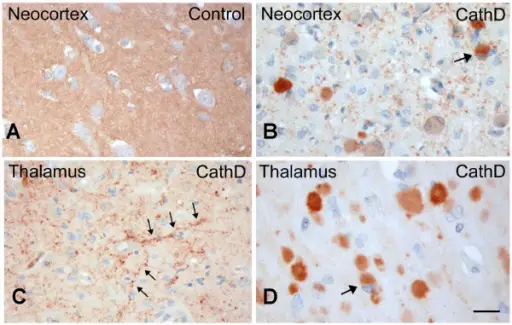
(A) Paraffin-embedded brain sections of a neurologically normal infant (Control) stained with polyclonal aSyn Ab, hSA-2, show strong reactivity of the neuropil in the neocortex. (B) Immunohistochemistry of brain specimens from CathD-deficient infants (CathD; n = 3), carried out in parallel, demonstrates marked reduction of neuropil staining. These sections also display scattered, cytoplasmic aSyn aggregates within neurons (identified by arrow). (C) Sections of the thalamus from the same individual as in B also reveal neuritic pathology (arrows), as well as (D) intracellular accumulation of aSyn, sometimes seen as juxtanuclear inclusion (arrow). Cathepsin D expression level affects alpha-synuclein processing, aggregation, and toxicity in vivo: Cullen V, Lindfors M, Ng J, Paetau A, Swinton E, Kolodziej P, Boston H, Saftig P, Woulfe J, Feany MB, Myllykangas L, Schlossmacher MG, Tyynelä J - Molecular brain (2009). Not altered. CC.
Intracellular accumulations are aggregations of substances which may include the following:
Lipids
Steatosis (Fatty Change)
Cholesterol and Cholesterol Esters
Proteins
Hyaline Change
Glycogen
Pigments
Exogenous Pigments
Endogenous Pigments
